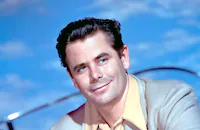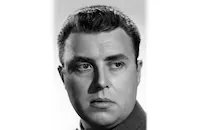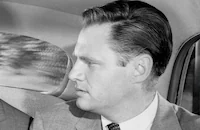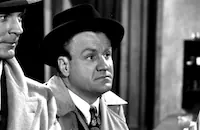The Big Heat

Brief Synopsis
Cast & Crew
Fritz Lang
Glenn Ford
Gloria Grahame
Jocelyn Brando
Alexander Scourby
Lee Marvin
Film Details
Technical Specs

Synopsis
After the suicide of detective Sgt. Tom Duncan, his wife Bertha takes his detailed notes on racketeer Mike Lagana's organization, then demands money and protection from the mob boss to keep the notes secret. Lagana places the Duncan situation with his right-hand man, Vince Stone. Homicide detective Sgt. Dave Bannion is assigned to investigate Duncan's death and upon questioning a bereft Bertha, finds her explanation that Duncan suffered a mysterious malady suspicious. Later at home with his wife Katie and young daughter Joyce, Dave reads that the police department has accepted Bertha's assertions without question. That evening Lucy Chapman, a fading B-girl, contacts Dave and they meet at The Retreat bar where Lucy debunks Bertha's story, claiming that she and Duncan dated and that Bertha had just agreed to give her husband a divorce. When Dave cautions Lucy not to attempt to blackmail Bertha, Lucy angrily threatens to take her information to the newspapers.
Dave then visits Bertha, who dismisses the divorce story, despite her knowledge of Duncan's relationship with Lucy. The next day at headquarters, Dave learns of the discovery of an unidentified woman who had been thrown from a car after being beaten and tortured. At the coroner's, Dave identifies the victim as Lucy, and the coroner reveals that she suffered numerous cigarette burns before being strangled. Department head Lt. Ted Wilkes summons Dave and advises him to stop harassing Bertha. Dave returns to The Retreat to question bartender-owner Tierney, who reveals nothing. That evening, Katie and Dave are interrupted by a phone caller, who insults Katie then threatens Dave. Furious, Dave goes to Lagana's house, where he accuses Lagana of corruption and Lucy's murder. The next day, Wilkes chastises Dave and insists he stop inquiring into Lucy's death as it is under the county sheriff's jurisdiction. Later, preparing for a night out with Katie, Dave angrily tells her that he should resign, but Katie encourages him to follow his instincts. Moments later, when Katie starts the Bannions' car, it explodes, killing her.
After Katie's funeral, Dave demands help from Wilkes and Commissioner Higgins, but when the commissioner airily assures him of his assistance, Dave accuses both of being paid stooges for Lagana and is suspended. Dave places Joyce with his brother-in-law Al, and moves into a hotel. Meanwhile, Lagana reproaches Stone for hiring Larry Gordon, who botched Lucy's murder and accidentally killed Katie instead of Dave. Stone claims he was not involved and fires Gordon. Lagana admits to Stone that Bertha is demanding more money and has arranged to have Duncan's notes sent to the newspaper in the event of her death. Concerned about the mounting publicity over the recent spate of deaths, Lagana hesitates at Stone's offer to kill Dave. After several days, Dave, acting on a tip regarding Lucy, goes to a junkyard, where the owner, Atkins, informs him that the man he seeks, Slim, is dead. Upon leaving, Atkins' secretary, elderly Selma Parker, stops Dave and reveals that shortly before his death, Slim was visited by two men, one of whom, "Larry," mentioned The Retreat. Dave returns to the bar and spots Stone and Debby Marsh. Stone is rolling dice with a woman and when he suspects her of cheating, he brutally burns her hand with his cigarette, provoking Dave's anger. Stone apologizes, gives the woman money and leaves, but Debby remains and offers to buy Dave a drink. Dave refuses, but when Debby follows him, he takes her to his hotel room in hopes of learning Larry's identity.
Debby reveals no information, and when her flirting upsets Dave, she leaves. Back at Stone's apartment, Debby finds him with several men, including Higgins. When Stone questions her about going off with Dave, she assures him that she said nothing. Outraged, Stone attacks Debby, then hurls a pot of boiling coffee into her face. Shortly afterward, Debby, her face swathed in bandages, returns to Dave's hotel, pleading for protection. She describes Stone's attack upon her and how Commissioner Higgins took her to the hospital. Realizing Dave's genuine concern for her, Debby divulges that "Larry" is Gordon, a hit man hired by Stone.
Armed with this information, Dave locates Gordon and through physical coercion learns that Duncan was on Lagana's payroll for years and that Lucy was murdered because she may have known about it. Gordon insists he does not know why Bertha has been spared, and Dave speculates she must have evidence with which she is blackmailing Lagana. Dave leaves, promising to make it known that Gordon has talked, and soon after, Lagana has Gordon killed. Stone repeats his offer to kill Dave, but Lagana is fearful about what Dave may have done with his newly acquired knowledge, so considers a plan to kidnap Joyce to gain Dave's silence. Later, a panicked Bertha telephones Lagana asking for help when Dave shows up at her house. Dave demands information on the papers Duncan left behind and Bertha initially feigns ignorance before taunting him with her secure position and his inability to prove anything. The police, summoned by Lagana, arrive, forcing Dave's withdrawal. Dave returns to the hotel and tries to answer Debby's questions about Katie before confiding his frustration that Bertha is unbreakable as long as she has Duncan's notes.
They are interrupted when Al's wife calls to say the police guard around the house has vanished. When Dave arrives, he discovers Al has rounded up several Army buddies to protect Joyce. Debby goes to see Bertha, who receives her coldly, then threatens to call Stone. Debby calmly shoots Bertha and leaves the gun behind. Meanwhile, Dave watches Stone's place and sees him arrive. Inside Stone's darkened apartment, Debby waits and throws a pot of boiling water into Stone's face and tells him she has just murdered Bertha. Stone shoots Debby in the back just as Dave bursts in. A shootout on the balcony ensues, then Debby manages to tell Dave about Bertha. Dave calls an ambulance and holds Stone hostage. After Wilkes and Dave's former partner arrive, Stone is duly arrested while Dave tells a dying Debby about Katie. A few days later, after the arrest of Lagana and Higgins, Dave is returned to duty.

Director

Fritz Lang
Cast

Glenn Ford

Gloria Grahame

Jocelyn Brando

Alexander Scourby

Lee Marvin
Jeanette Nolan

Peter Whitney

Willis Bouchey

Robert Burton

Adam Williams
Howard Wendell
Chris Alcaide
Michael Granger
Dorothy Green

Carolyn Jones
Ric Roman
Dan Seymour
Edith Evanson
Norma Randall
Sid Clute
Joe Mell
Linda Bennett
Herbert Lytton

Lyle Latell
Ezelle Poule
Byron Kane
Mike Ross
Ted Stanhope
Phil Arnold
Bill Murphy
Douglas Evans
Mike Mahoney

Paul Maxey
Pat Miller
Charles Cane
Kathryn Eames
Al Eben
William Vedder
Harry Lauter
Robert Forrest
Phil Chambers
John Close
John Crawford

John Doucette
John Merton
Jimmy Gray
Crew
Robert Arthur
Mischa Bakaleinikoff
Sydney Boehm
Clay Campbell
George Cooper
Milton Feldman
Helen Hunt
William Kiernan
Charles Lang
Jean Louis
Charles Nelson
Robert Peterson

Photo Collections
Videos
Movie Clip






Trailer
Hosted Intro
Film Details
Technical Specs

Articles
The Big Heat
From almost the start of his career, Lang had depicted the criminal underworld in such German classics as Doktor Mabuse, der Spieler (1922) and M (1931). When he fled Germany to escape the Nazis, his work took on a darker tone, with revenge as one of his primary themes. But his opposition to Hitler would lead to trouble years later, when he was falsely branded a communist in the early 1950s and blacklisted for two years. Once he managed to clear his name, however, he signed a two-picture deal with Columbia Pictures that began with this taut crime thriller.
The Big Heat - the title is criminal slang for a police crackdown on illegal activities - was originally a serial written for the Saturday Evening Post. It was so popular that Columbia bought the rights even before the final chapter appeared. They assigned former crime reporter Sydney Boehm to the script. His chief change was to transform the main character, a police officer out for vengeance when a mob hit on him takes out his wife instead, from a scholarly detective to an average guy. This fit perfectly with Lang's approach to filmmaking, creating a character with whom the audience could easily identify.
To play Lang's Everyman, Columbia assigned Glenn Ford, their most reliable box-office star. Although rarely cast in the studio's most prestigious films, Ford's presence insured strong interest from both audiences and the studio. At the time, he was under contract for just one film a year, so they weren't about to waste his commitment on just any film. His powerful presence and innate integrity helped make the picture a hit. In addition, he inspired an in-joke when his first meeting with vicious gangster Lee Marvin was underscored with "Put the Blame on Mame," the hit song from one of Ford's biggest films, Gilda (1946).
Most of the roles in The Big Heat were filled with contract players on the Columbia lot, which proved particularly fortunate in the casting of future Oscar-winner Lee Marvin as a sadistic thug and Gloria Grahame as his tough-talking moll. Grahame was one of the hottest young actresses in Hollywood at the time. As filming started, she had just won the 1952 Academy Award as Best Supporting Actress for The Bad and the Beautiful. That may have caused some problems with Lang. He would later claim that she tried to convince him to change her character from a gangster's girlfriend to an heiress. He got her to accept the role as written by threatening to "show your back all the time and get a parrot to say your dialogue!" Grahame claimed that her only problem was the lack of good lines for her character. She appealed to her boyfriend and future husband, writer Cy Howard, for help. He contributed the film's two most famous lines: her comment to a racketeering cop's widow that "We're sisters - under the mink"; and her assessment of Ford's shabby hotel room as "early nothing." That had actually been Howard's comment a few months earlier when he visited her home for the first time.
Grahame was fast earning a reputation as the screen's number one hard-luck dame, or as she called herself, "Miss Obituary." She fell victim to a plane crash in The Bad and the Beautiful, a crazed driver in Sudden Fear (1952), and a pot of boiling coffee in The Big Heat. Lang had carefully set up the latter scene. As Grahame and Marvin argue, the camera picks up shots of a glass coffee pot boiling furiously on a hot plate - hotter than any sane person would ever want it to be. When Marvin picks up the pot and hurls it in Grahame's face, the camera focuses on his reaction, a face of pure evil that allows the viewer to imagine more suffering than Lang could ever have shown. But years later, he had to laugh at the illogic of the scene. In an interview with Peter Bogdanovich, he said, "I wonder how many women who have thrown hot coffee in their husbands' faces were very disappointed with the result and said, 'Lang is a lousy director.'"
Producer: Robert Arthur
Director: Fritz Lang
Screenplay: Sydney Boehm
Based on the serial in the Saturday Evening Post by William P. McGivern
Cinematography: Charles Lang
Art Direction: Robert Peterson
Music: Daniele Amfitheatrof
Cast: Glenn Ford (Dave Bannion), Gloria Grahame (Debby Marsh), Jocelyn Brando (Katie Bannion), Alexander Scourby (Mike Lagana), Lee Marvin (Vince Stone), Jeanette Nolan (Bertha Duncan), Carolyn Jones (Doris).
BW-90m.
by Frank Miller

The Big Heat
Quotes
They come and go like flies.- Tierney
Only this fly got herself strangled.- Dave Bannion
These things, happen, Sergeant.- Tierney
Hey, that's nice perfume.- Vince Stone
Something new. It attracts mosquitoes and repels men.- Debby Marsh
Hey, I like this. Early nothing!- Debby Marsh
The main thing is to have the money. I've been rich and I've been poor. *Believe* me, rich is better.- Debby Marsh
We're sisters under the mink.- Debby Marsh
Trivia
When Lee Marvin first sees Glenn Ford face to face, the music in the background is "Put the Blame on Mame," a reference to Ford's performance in Gilda (1946).
Notes
William P. McGivern's novel was serialized in Saturday Evening Post (Dec 1952-February 1953). A December 1952 Daily Variety news item notes that Jerry Wald, then executive producer of The Big Heat, hoped to cast either Paul Muni, George Raft or Edward G. Robinson in the lead role. The same item reveals that Columbia paid $40,000 for the story. According to information in the file on the film in the MPAA/PCA Collection at the AMPAS Library, the original script for The Big Heat was rejected due to the story's "justification of revenge," "immoral relationship(s)," "corruption in a(n)...American city" and "an excessive amount of brutality and gruesomeness." While producer Robert Arthur, writer Sydney Boehm and director Fritz Lang toned down these themes and cut the relationship between detective "Dave Bannion" and moll "Debby Marsh," according to the PCA file, "rather spectacular brutality" remained. One of the film's most famous scenes, of "Vince Stone" throwing boiling coffee into Debby's face, reflects Lang's efforts to reduce the graphic nature of the violence by keeping actress Gloria Grahame off-screen. The Legion of Decency awarded the film a "B" rating.

Miscellaneous Notes
Released in United States 1999
Released in United States Fall October 14, 1953
Completed shooting April 18, 1953.
Re-released in Munich December 13, 1990.
Released in United States 1999 (Shown in New York City (Film Forum) as part of program "Columbia 75" November 19 - January 13, 1999.)
Released in United States Fall October 14, 1953















